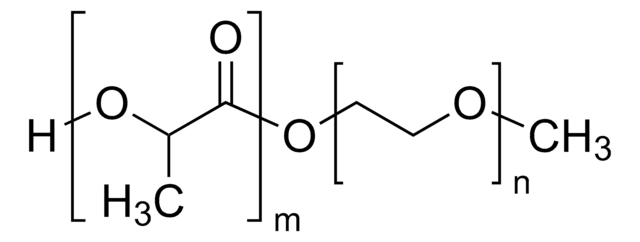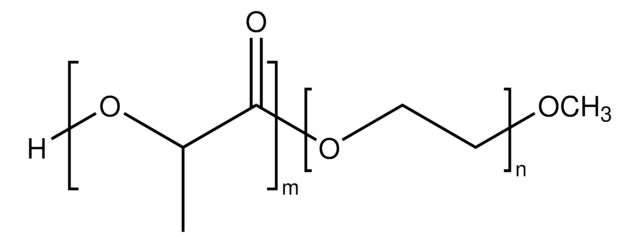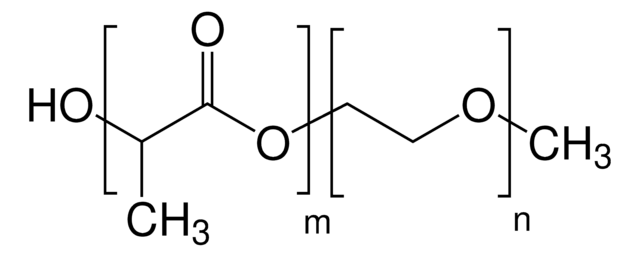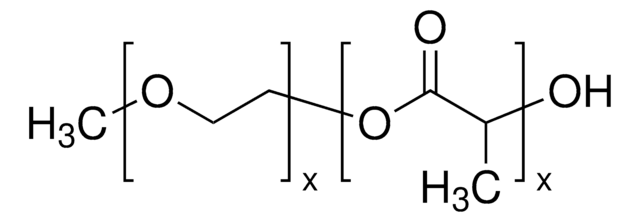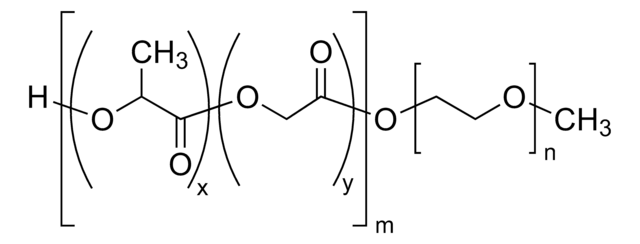764736
Poly(ethylene glycol) methyl ether-block-poly(D,L lactide)-block-decane
PEG average Mn 2,000, PDLLA average Mn 2,000
Synonyme(s) :
PEG-PDLLA-decane, PEG-b-PLA-b-decane, PEG-PLA
About This Item
Produits recommandés
Forme
pellets
Niveau de qualité
Poids mol.
PDLLA average Mn 2,000
PEG average Mn 2,000
average Mn 4,000 (total)
Intervalle de dégradation
2-5 weeks
Température de transition
Tm 29-33 °C
PDI
<1.1 (typical PEG)
<1.2
<1.3 (overall)
Température de stockage
2-8°C
Catégories apparentées
Description générale
Application
Caractéristiques et avantages
- Good biocompatibility, low immunogenicity and good degradability.
- Properties can be easily modulated by changing the block copolymer segment sizes to suit a particular application.
Code de la classe de stockage
11 - Combustible Solids
Classe de danger pour l'eau (WGK)
WGK 3
Point d'éclair (°F)
>230.0 °F
Point d'éclair (°C)
> 110 °C
Faites votre choix parmi les versions les plus récentes :
Certificats d'analyse (COA)
Vous ne trouvez pas la bonne version ?
Si vous avez besoin d'une version particulière, vous pouvez rechercher un certificat spécifique par le numéro de lot.
Déjà en possession de ce produit ?
Retrouvez la documentation relative aux produits que vous avez récemment achetés dans la Bibliothèque de documents.
Les clients ont également consulté
Articles
One of the common difficulties with intravenous drug delivery is low solubility of the drug. The requirement for large quantities of saline to dissolve such materials limits their clinical use, and one solution for this problem that has recently generated interest is the formation of drug-loaded micelles.
Microparticle drug delivery systems have been extensively researched and applied to a wide variety of pharmaceutical and medical applications due to a number of advantages including injectability, local applicability to target tissues and sites, and controlled drug delivery over a given time period.
Local delivery of bioactive molecules using an implantable device can decrease the amount of drug dose required as well as non-target site toxicities compared to oral or systemic drug administration.
Aliphatic polyesters such as polylactide, poly(lactide-co-glycolide) and polycaprolactone, as well as their copolymers, represent a diverse family of synthetic biodegradable polymers that have been widely explored for medical uses and are commercially available.
Notre équipe de scientifiques dispose d'une expérience dans tous les secteurs de la recherche, notamment en sciences de la vie, science des matériaux, synthèse chimique, chromatographie, analyse et dans de nombreux autres domaines..
Contacter notre Service technique